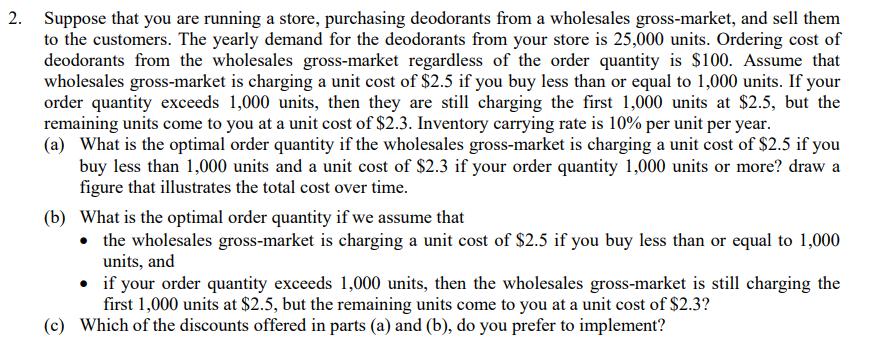Answered step by step
Verified Expert Solution
Question
1 Approved Answer
2. Suppose that you are running a store, purchasing deodorants from a wholesales gross-market, and sell them to the customers. The yearly demand for

2. Suppose that you are running a store, purchasing deodorants from a wholesales gross-market, and sell them to the customers. The yearly demand for the deodorants from your store is 25,000 units. Ordering cost of deodorants from the wholesales gross-market regardless of the order quantity is $100. Assume that wholesales gross-market is charging a unit cost of $2.5 if you buy less than or equal to 1,000 units. If your order quantity exceeds 1,000 units, then they are still charging the first 1,000 units at $2.5, but the remaining units come to you at a unit cost of $2.3. Inventory carrying rate is 10% per unit per year. (a) What is the optimal order quantity if the wholesales gross-market is charging a unit cost of $2.5 if you buy less than 1,000 units and a unit cost of $2.3 if your order quantity 1,000 units or more? draw a figure that illustrates the total cost over time. (b) What is the optimal order quantity if we assume that the wholesales gross-market is charging a unit cost of $2.5 if you buy less than or equal to 1,000 units, and if your order quantity exceeds 1,000 units, then the wholesales gross-market is still charging the first 1,000 units at $2.5, but the remaining units come to you at a unit cost of $2.3? (c) Which of the discounts offered in parts (a) and (b), do you prefer to implement?
Step by Step Solution
★★★★★
3.53 Rating (153 Votes )
There are 3 Steps involved in it
Step: 1
a The optimal order quantity in this scenario is 1000 units This is because ordering more than 10...
Get Instant Access to Expert-Tailored Solutions
See step-by-step solutions with expert insights and AI powered tools for academic success
Step: 2

Step: 3

Ace Your Homework with AI
Get the answers you need in no time with our AI-driven, step-by-step assistance
Get Started


